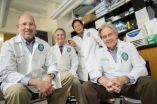Test increases odds of correct surgery for thyroid cancer patients
2014-07-25
(Press-News.org) PITTSBURGH -- The routine use of a molecular testing panel developed at UPMC greatly increases the likelihood of performing the correct initial surgery for patients with thyroid nodules and cancer, report researchers from the University of Pittsburgh Cancer Institute (UPCI), partner with UPMC CancerCenter.
The test, available at the UPMC/UPCI Multidisciplinary Thyroid Center and other diagnostic testing agencies, improved the chances of patients getting the correct initial surgery by 30 percent, according to the study published this month in the Annals of Surgery.
"Before this test, about one in five potential thyroid cancer cases couldn't be diagnosed without an operation to remove a portion of the thyroid," said lead author Linwah Yip, M.D., assistant professor of surgery in Pitt's School of Medicine and UPMC surgical oncologist. Previously, "if the portion removed during the first surgery came back positive for cancer, a second surgery was needed to remove the rest of the thyroid. The molecular testing panel now bypasses that initial surgery, allowing us to go right to fully removing the cancer with one initial surgery. This reduces risk and stress to the patient, as well as recovery time and costs."
Cancer in the thyroid, which is located in the "Adam's apple" area of the neck, is now the fifth most common cancer diagnosed in women. Thyroid cancer is one of the few cancers that continues to increase in incidence, although the five-year survival rate is 97 percent.
Previously, the most accurate form of testing for thyroid cancer was a fine-needle aspiration biopsy, where a doctor guides a thin needle to the thyroid and removes a small tissue sample for testing. However, in 20 percent of these biopsies, cancer cannot be ruled out. A lobectomy, which is a surgical operation to remove half of the thyroid, is then needed to diagnose or rule-out thyroid cancer. In the case of a postoperative cancer diagnosis, a second surgery is required to remove the rest of the thyroid.
Researchers have identified certain gene mutations that are indicative of an increased likelihood of thyroid cancer, and the molecular testing panel developed at UPMC can be run using the sample collected through the initial, minimally invasive biopsy, rather than a lobectomy. When the panel shows these mutations, a total thyroidectomy is advised.
Dr. Yip and her colleagues followed 671 UPMC patients with suspicious thyroid nodes who received biopsies. Approximately half the biopsy samples were run through the panel, and the other half were not. Patients whose tissue samples were not tested with the panel had a 2.5-fold higher statistically significant likelihood of having an initial lobectomy and then requiring a second operation.
"We're currently refining the panel by adding tests for more genetic mutations, thereby making it even more accurate," said co-author Yuri Nikiforov, M.D., Ph.D., professor in the Department of Pathology at Pitt and director of thyroid molecular diagnostics at the UPMC/UPCI Multidisciplinary Thyroid Center. "Thyroid cancer is usually very curable, and we are getting closer to quickly and efficiently identifying and treating all cases of thyroid cancer."
In 2009, the American Thyroid Association (ATA) revised its guidelines to add that doctors may consider the use of molecular markers when the initial biopsy is inconclusive.
"The ATA is currently revising those guidelines to take into account the latest research, including our findings," said senior author Sally Carty, M.D., Pitt professor of surgery, co-director of the UPMC/UPCI Multidisciplinary Thyroid Center and recent president of the American Association of Endocrine Surgeons. "The molecular testing panel holds promise for streamlining and eliminating unnecessary surgery not just here but nationwide."
A previous study led by Dr. Yip showed the panel to be cost-saving when used to help in the diagnosis of thyroid cancer.
Each year, approximately half of the 25,000 patients assessed at UPMC's Multidisciplinary Thyroid Center are found to have thyroid conditions, and more than 900 thyroid operations are performed by the center's surgeons. The center aims to provide patients with one-stop evaluation from thyroid experts in a variety of fields, including surgery and endocrinology.
INFORMATION:
Additional researchers on this study are Laura I. Wharry, M.D., Michaele J. Armstrong, Ph.D., Ari Silbermann, B.S., Kelly L. McCoy, M.D., and Michael T. Stang, M.D., all of the Pitt Department of Surgery; Nobuyuki P. Ohori, M.D., and Marina N. Nikiforov, M.D., all of the Pitt Department of Pathology; Shane O. LeBeau, M.D., Christopher Coyne, M.D., and Steven P. Hodak, M.D., all of the Pitt Department of Endocrinology; Julie E. Bauman, M.D., of the PItt Department of Hematology/Oncology; Jonas T. Johnson, M.D., of the Pitt Department of Otolaryngology; and Mitch E. Tublin, M.D., of the Pitt Department of Radiology.
This study was funded by a grant from UPMC.
About UPMC CancerCenter
UPMC CancerCenter connects patients to the integrated expertise of leading clinicians, academic researchers, specialty programs and treatment centers. By partnering with the University of Pittsburgh Cancer Institute (UPCI), designated as a Comprehensive Cancer Center by the National Cancer Institute, we are accelerating the breakthroughs in our labs into clinical practice around the world. Backed by the collective strengths of UPMC and UPCI, UPMC CancerCenter is revolutionizing cancer research, care and prevention – one patient at a time.
About UPCI
As the only NCI-designated comprehensive cancer center in western Pennsylvania, UPCI is a recognized leader in providing innovative cancer prevention, detection, diagnosis, and treatment; bio-medical research; compassionate patient care and support; and community-based outreach services. Investigators at UPCI, a partner with UPMC CancerCenter, are world-renowned for their work in clinical and basic cancer research.
http://www.upmc.com/media
ELSE PRESS RELEASES FROM THIS DATE:
Brain tumor causes and risk factors elude scientists
2014-07-25
Today, nearly 700,000 people in the U.S. are living with a brain tumor, and yet, when it comes to pinpointing causes or risk factors, scientists are still searching for answers.
"Right now, we don't know who, we don't know when, and we don't know why people develop brain tumors," said Elizabeth M. Wilson, MNA, President and CEO, American Brain Tumor Association. "It's frustrating for the brain tumor community, and it's why the American Brain Tumor Association funds research to pursue answers to these questions, and it's why we host this national conference to provide ...
Is Europe putting cancer research at risk?
2014-07-25
The European Society for Medical Oncology (ESMO), the leading pan-European association representing medical oncology professionals, has expressed concern that the proposed EU General Data Protection Regulation [1] could make cancer research impossible and add a significant burden to both doctors and cancer patients.
The proposed wording of the regulation [2] stipulates 'explicit and specific patient consent', meaning that researchers would have to approach patients every single time research is planned in order to consult their data or use tissue samples stored for research ...
Informed consent: False positives not a worry in lung cancer study
2014-07-25
PROVIDENCE, R.I. [Brown University] — The U.S. Preventive Services Task Force recently recommended computerized tomography (CT) lung screening for people at high risk for cancer, but a potential problem with CT is that many patients will have positive results on the screening test, only to be deemed cancer-free on further testing. Many policymakers have expressed concern that this high false-positive rate will cause patients to become needlessly upset. A new study of National Lung Screening Trial participant responses to false positive diagnoses, however, finds that those ...
Exposure to dim light at night may make breast cancers resistant to tamoxifen
2014-07-25
PHILADELPHIA — For rats bearing human breast tumors, exposure to dim light at night made the tumors resistant to the breast cancer drug tamoxifen, according to data published in Cancer Research, a journal of the American Association for Cancer Research. The negative effects of dim light exposure on tamoxifen treatment were overcome by giving rats a melatonin supplement during the night.
"Resistance to tamoxifen is a growing problem among patients with hormone receptor-positive breast cancer," said Steven M. Hill, PhD, professor of structural and cellular biology and the ...
Total darkness at night is key to success of breast cancer therapy -- Tulane study
2014-07-25
Exposure to light at night, which shuts off nighttime production of the hormone melatonin, renders breast cancer completely resistant to tamoxifen, a widely used breast cancer drug, says a new study by Tulane University School of Medicine cancer researchers. The study, "Circadian and Melatonin Disruption by Exposure to Light at Night Drives Intrinsic Resistance to Tamoxifen Therapy in Breast Cancer," published in the journal Cancer Research, is the first to show that melatonin is vital to the success of tamoxifen in treating breast cancer.
Principal investigators and ...
Zerenex™ (ferric citrate) long-term Phase 3 study results published in JASN
2014-07-25
New York, NY - July 24, 2014 -- Keryx Biopharmaceuticals, Inc. (Nasdaq:KERX) (the "Company") announced the publication of results from the long-term, randomized, active control Phase 3 study of Zerenex (ferric citrate), the Company's investigational oral ferric iron-based phosphate binder, for the treatment of hyperphosphatemia in patients with end-stage renal disease (ESRD) on dialysis. The PERFECTED study (PhosphatE binding and iRon delivery with FErric CiTrate in EsrD) was published online today in the Journal of the American Society of Nephrology (JASN).
This Phase ...
New research suggests Saharan dust is key to the formation of Bahamas' Great Bank
2014-07-25
MIAMI – A new study suggests that Saharan dust played a major role in the formation of the Bahamas islands. Researchers from the University of Miami (UM) Rosenstiel School of Marine and Atmospheric Science showed that iron-rich Saharan dust provides the nutrients necessary for specialized bacteria to produce the island chain's carbonate-based foundation.
UM Rosenstiel School Lewis G. Weeks Professor Peter Swart and colleagues analyzed the concentrations of two trace elements characteristic of atmospheric dust – iron and manganese – in 270 seafloor samples collected along ...
Overweight and obese preschoolers lose more weight when parent is also treated
2014-07-24
BUFFALO, N.Y. – Primary care treatment of overweight and obese preschoolers works better when treatment targets both parent and child compared to when only the child is targeted, according to research published this week in Pediatrics and conducted at the University at Buffalo and Women and Children's Hospital of Buffalo.
Children enrolled in this study were overweight or obese and had one parent who participated in the study who also was overweight or obese, according to body mass index (BMI) measurements, calculated based on height and weight.
During the course of the ...
NYSCF scientists one step closer to cell therapy for multiple sclerosis patients
2014-07-24
NEW YORK, NY (July 24, 2014) – Scientists at The New York Stem Cell Foundation (NYSCF) Research Institute are one step closer to creating a viable cell replacement therapy for multiple sclerosis from a patient's own cells.
For the first time, NYSCF scientists generated induced pluripotent stem (iPS) cells lines from skin samples of patients with primary progressive multiple sclerosis and further, they developed an accelerated protocol to induce these stem cells into becoming oligodendrocytes, the myelin-forming cells of the central nervous system implicated in multiple ...
Study indicates large raptors in Africa used for bushmeat
2014-07-24
Bushmeat, the use of native animal species for food or commercial food sale, has been heavily documented to be a significant factor in the decline of many species of primates and other mammals. However, a new study indicates that more than half of the species being consumed are birds, particularly large birds like raptors and hornbills.
"By surveying not only the meat made available for sale but the meat that is being eaten inside the forest by hunters and brought to villages for consumption, we noted a significant percentage attributed to bird species," said Bethan ...



